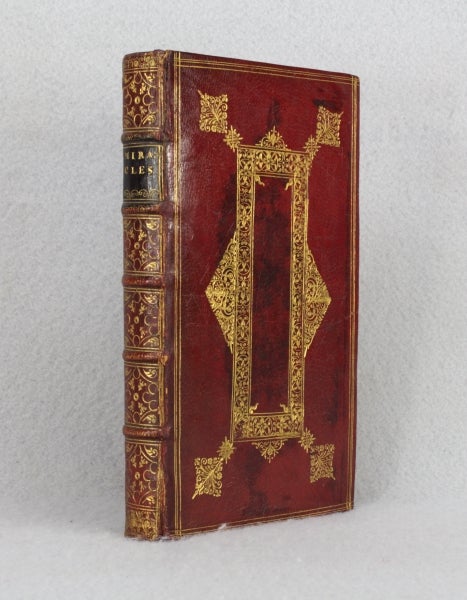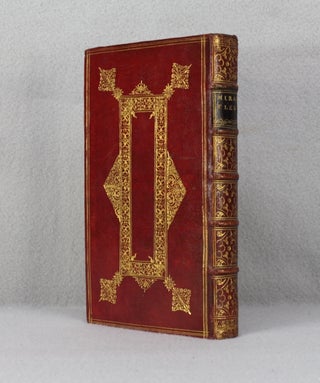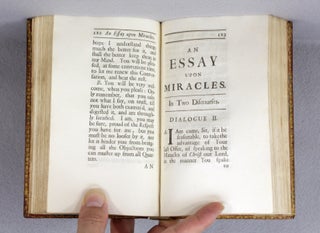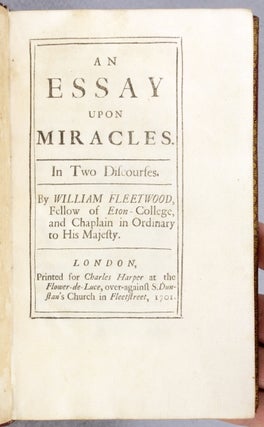AN ESSAY UPON MIRACLES. IN TWO DISCOURSES.
(London: Printed for Charles Harper, 1701). 203 x 146 mm. (8 x 5 3/4"). 8 p.l., 277, [3] pp. FIRST EDITION.
FINE CONTEMPORARY CRIMSON MOROCCO, GILT, BY ROBERT STEEL, covers with French fillet border, central floral frame with triangular filigree sidepieces and oblique fleuron cornerpieces, raised bands, spine heavily gilt in compartments adorned with curls and small tools, black morocco label, gilt-rolled turn-ins, marbled endpapers, all edges gilt. A Large Paper Copy. ESTC T83611. ◆Front joint a bit rubbed and with three very short cracks (spine ends and rear joint minimally worn), darkened areas on front board, but the binding entirely solid, with shining gilt, and AN EXTRAORDINARILY FINE COPY INTERNALLY, almost preternaturally clean, fresh, and bright.
From the beginning of the 18th century, but typical of earlier examples from the Restoration period, this pleasing binding is characteristic of the work of Robert Steel (sometimes spelled "Steele"), regarded as one of the best binders of his day. The floral roll employed in the cover frame here is the same as that which is used on the Steel bindings appearing as item #70 in Maggs Catalogue 1212, item #25 in Maggs Catalogue 861, item #118 in Maggs Catalogue 1075, and item #98 in Breslauer Catalogue 106. From 1668-75 Steel was an apprentice to Samuel Mearne (1624-83), described by Davenport as simply "one of the greatest bookbinders of any time." Steel is thought to have taken over the tools of the Mearne bindery shortly after the death of Charles Mearne in 1686, and he may even have taken over the Mearne premises in London's Little Britain. In 1705, English bookseller and author John Dunton (1659-1733) said that when he "met with a Nice [i.e., discerning] Customer, no binding wou'd serve him but Mr. Steele's," celebrated as they were for their "Fineness and Goodness." Steel died ca. 1710, and the business was continued by his widow (or, as Nixon argues, his daughter) Jane until 1718. Ranked among the most eloquent preachers of his time, William Fleetwood (1656-1723) regularly addressed audiences including the mayor and corporation of London, the king, both houses of Parliament, and other august public organizations. He was later named chaplain to William III and Mary II. Fleetwood defines a miracle to be "an extraordinary operation of God, against the known course and settled laws of nature, appealing to the senses." Although our binding is historically significant and well preserved, it is the amazing condition of the text here that is especially memorable. (ST12725c)
Price: $1,750.00




